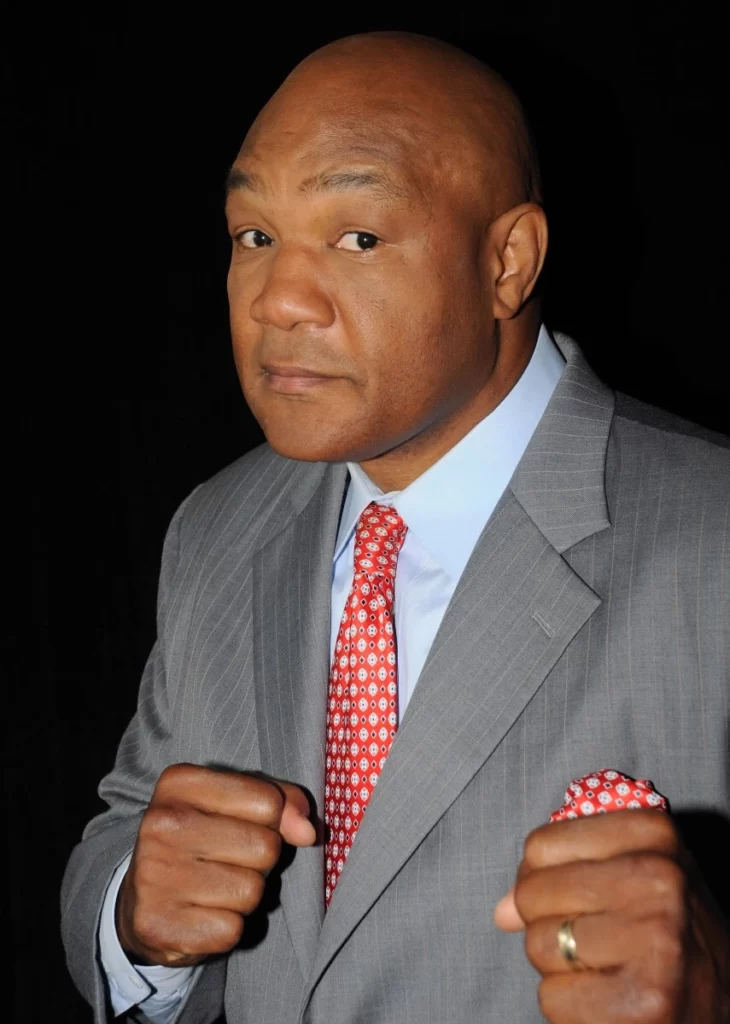There are few boxers that transcend the sport, in
Why is Foreman the Odd One Out?
To understand the unlikely story of George Foreman I will give you a brief history of his life and career. Foreman started out life a delinquent by his own admission, growing up incredibly poor (he states he was “
According to his account of his early life it was on one of his run-ins with the police that he realised that he wanted more from life than he currently had, which wasn’t a huge issue considering he had very little/nothing, so anything more than that would be a small victory.
Job Corps and Boxing
At around this time he found an opportunity through a government work program that was called Job Corps, aiming to take young people and give them skills that would enable them to find work in the trades. The key driver in Foreman’s success from this point on was his determination, he learned skills he had previously disregarded (such as reading and writing) and also caught the eye of a boxing trainer who felt Big George would be an ideal candidate for boxing due to his size and stature.
Like many things in George’s life up to that point, he had very little early success with the boxing, stepping into the ring confident, he was quickly schooled by an opponent half his size. Undeterred (for the most part as he had temporarily decided boxing wasn’t for him) he continued boxing and quickly picked up the skill set that enabled him to have a successful amateur career.
Olympic Games
His punching power and physique carried him so far in his amateur career that he was selected to represent the United States at the 1968 Olympic Games held in Mexico City. This is when the world first started to see there was something a bit different about George. The Olympic Games that year were plagued with deep racial undercurrents, with black athletes using the Olympic platform to solidify an anti-oppression political movement, with winners giving black power salutes and speaking out against the inequalities in the US.
George Foreman had every opportunity to join in this racial rally and feed into the inequality narrative. Except George Foreman hadn’t experienced the inequality, as far as he was concerned, from his life experiences, he had been afforded opportunities by the US government (through Job Corps) to escape the dire poverty he grew up in. He was also given the opportunity to represent the United States in boxing, a sport he had found a deep-felt love for.
Foreman wasn’t a particularly gifted boxer in technical terms, but he was an extremely good boxer in physical terms. What he lacked in finesse he easily compensated for when he
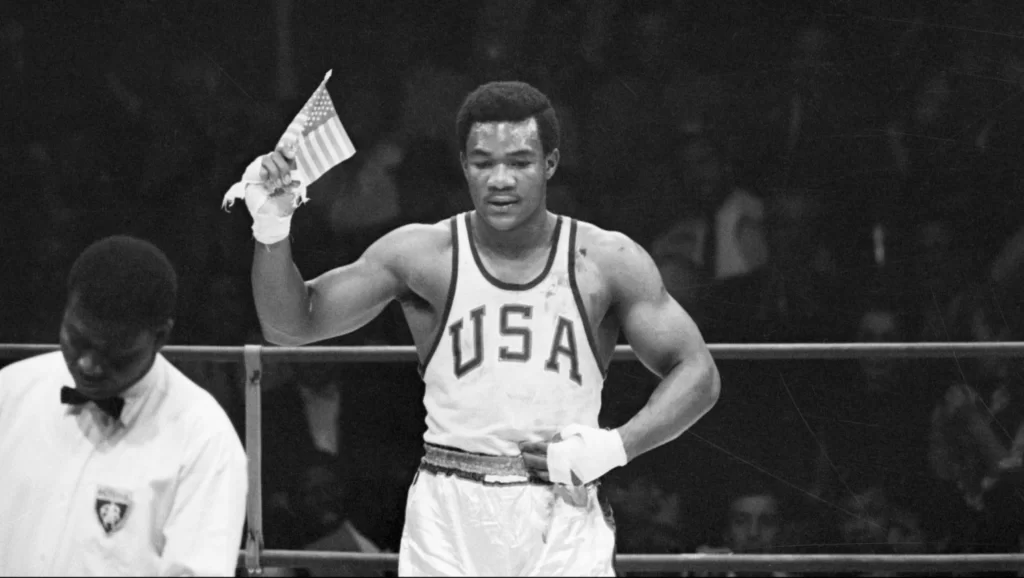

So effective, that he easily outclassed his Russian opponent in the final and won the Olympic Gold medal. What did Foreman do when he won? He grabbed a tiny United States flag and walked to all corners of the ring, waving his stars and stripes and bowing humbly.
Behind the scenes George was immediately labelled a traitor, an Uncle Tom, a black man that hadn’t stuck to the narrative. When he returned home this sentiment was quickly impressed upon him by the wider black community. Something that George didn’t understand, because he, like his experience, was different. He refused, from those very early stages to follow anyone else’s narrative for his life story. Only George Foreman was going to determine the story of George Foreman.
Professional Boxing (First Career)
George Foreman’s professional boxing career is split into two parts with a decade long hiatus separating the two which we will get to shortly. His first career was very much typical of any successful heavyweight boxer in the United States, he built up an impressive record fighting mostly journeymen for very little money in dingy halls, until his record looked so good on paper that he had earned himself a title shot.
Foreman vs Frazier
In the absence of Muhammad Ali, who had been stripped of his title, Joe Frazier had become the best heavyweight boxer in the world. Famed for his rushing style, a wicked left hook and good movement, he was a formidable champion. Foreman on the other hand was relatively unknown and the fight was expected not to last long with a Frazier win being inevitable.
Foreman didn’t stick to this narrative either, he emphatically dismantled Frazier, knocking him down multiple times and making Frazier look completely ineffective. Frazier’s saving grace in his Foreman fights was that he always got back up and he showed true grit and determination to keep going in the face of a ferocious and hard-hitting Foreman.
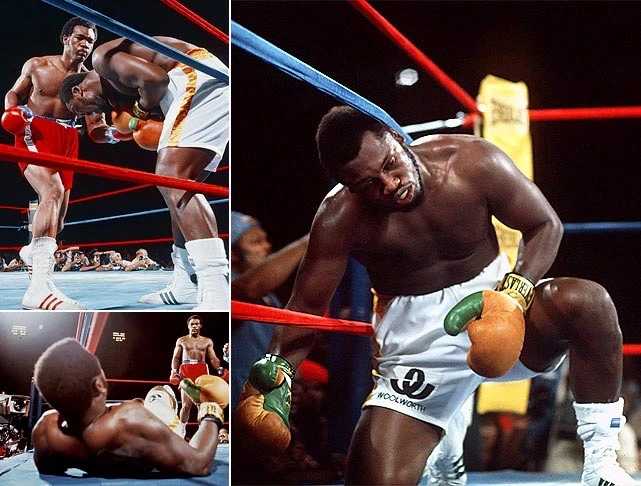

In just a matter of minutes, George Foreman had gone from relative obscurity to becoming the heavyweight champion of the world. Catapulted into the limelight. The early Foreman was shy though, and instead of expressing this shyness he chose to imitate his mentor Sonny Liston with a stoic, mean persona. This cold exterior didn’t wash well with the media or fans and Foreman wasn’t a popular champion.
Foreman vs Ali
After a successful and brutal title defence against Ken Norton, the stage was set for a returning Ali to showdown with Foreman. Few gave Ali a chance against Foreman with the realisation that although he wasn’t popular his punching power was enough to destroy anyone put in front of him. Ali used his platform as the popular people’s champion to belittle George, making disparaging and racially derogatory comments about Foreman.
The fight itself is shrouded in controversy, with much to be said about what actually went down in Zaire. Foreman rarely talks about the details of what actually happened now, instead choosing humility and simply stating he lost to the better man on the night.
One thing is for sure, Zaire conspired against Foreman and he left Africa a broken man.
Among many of the things that worked in Ali’s favour that night
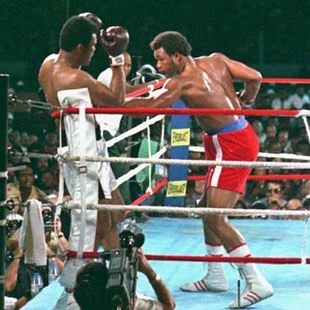

- Ropes were slackened and are noticeably much looser than any boxing ropes should be, allowing Ali to lean back on them and take the sting and momentum out of George’s punches. This became the famous “Rope a Dope” tactic that Ali would coin as his key to success.
- Despite the ropes being in Ali’s favour, Foreman did manage to tee off heavily on Ali throughout much of the fight with Ali frequently holding and pulling on George, this grab and move tactic is now a lot more common in boxing and referees are keen to break holds to encourage boxing. Ali was given favourable time clinching Foreman with little breakage by the referee.
- The heat of Zaire was overwhelming, training for the fight was arduous and Foreman was cut in camp delaying the fight further and resulting in Foreman not feeling in optimal condition by fight night.
- Prior to the fight, Foreman is adamant he was given tainted water, and throughout the fight he felt sluggish. If you re-watch the fight and compare it to other Foreman fights, he is noticeably loath and slow to react compared to his other fights.
- The short count. In the eighth round Foreman was sent tumbling to the canvas, fatigued and overwhelmed he succumbed to a flurry of Ali punches after another bout of laying on the ropes and holding. A referee is supposed to count to ten and if the fighter is not on their feet and responsive in this time frame it is waved off. Foreman was up in eight and although looked weary, was not wobbly legged and was still alert and able to continue. The referee didn’t assess Foreman, instead waving off the fight as he got up.
The last point is crucial in understanding how skewed the fight was in favour of Ali behind the scenes, Don King orchestrated the fight and knew Ali would be a much more lucrative champion. Reigning champions are typically given a more lenient approach especially with knock downs and counts, notably Frazier was allowed to continue numerous times against Foreman despite it being clear that he was not fit to continue.
Foreman was not only denied that luxury, even more unjustly he was penalised and given a short count.
Ali was quickly restored as champion and Foreman fell into a deep and bitter depression. Returning to the US he vowed to fight Ali again and show he was the rightful winner. Ali wilfully denied Foreman this opportunity (despite affording Frazier the opportunity) and George ultimately was left with an unavenged loss on his record. So revered is Ali, that criticism of him as a champion and his career often falls on deaf ears, but in the case of George Foreman, Ali was incredibly out of line.
Looking back on those days and knowing the reverence of Ali, as well as his own position in life, Foreman speaks kindly of the situation, able to find closure through his preaching and relationship with God (see a bit further down) and rise above letting that moment define him.
Something that is absolutely clear is that Ali ducked Foreman, the punches that he had felt in Zaire had cemented in his mind that he absolutely did not want to step back in the ring with Foreman.
The End of The First Career
Foreman wasn’t the same for a long while after Zaire, he went on to fight a number of contender fights in the aim of forcing Ali’s hand and making him have to submit to a mandatory defence. His spirit had been truly broken and although he resolved never to be “knocked out” again (he never was), he never found the professional closure he needed and his fights became as bitter as he had become. He had lost his passion for boxing, culminating in a points loss to Jimmy Young.
Foreman had a full mental and physical breakdown in the changing room after the fight. He also had
Those around him mistook this for mental illness and it came as a massive surprise when Foreman hung up his gloves and retired from boxing to pursue a life as a preacher.
Foreman: The Punching Preacher
Foreman worked actively (and still does) within his local community, becoming a born again Christian and gaining a large following with his message. It was during this time the
Founding boxing projects to keep children off the streets (and away from a life of crime) he realised he would need money in order to keep his community work going. It was this quest for sustainability that caused Foreman to pick up his boxing gloves again and against all odds return to the ring.
Even more remarkable is that Foreman hadn’t trained for the ten years that he had spent out of the ring, he had gained a lot of weight as he was particularly fond of his food.
The Second Career – Defying the Odds
At the age of 38 (pensionable age in boxing), Foreman embarked on a comeback, his goals were simple, get lots of money and become heavyweight champion again. Immediately the media got behind Foreman, instead of the being reviled he was greeted back to boxing with open arms and many were keen to see him box again. Though few gave him any chance of success.
The George Foreman that stepped back into the ring was an altogether different and more formidable opponent. Many felt his prime (and still feel) was during his first career, although personally I think Foreman is a rare breed that peaked late and his prime was actually in his later years.
Despite the reticence about his chances, Foreman kept fighting opponents and kept knocking them out. His heavy hands were still present but there was also a refinement to his boxing style. Gone was the anxious and keen Foreman of old, instead, the new Foreman was relaxed, calm and calculated with his attacks, making his onslaughts all the more devastating. He stood in his corner between rounds and refused to take the stool, he crossed his arms for
He also ate a lot of cheeseburgers. Whether or not Foreman had a specific training diet remains to be seen, what was evident was George liked to eat and he liked to come into his fights heavy.
The George Foreman Grill


During this time, the popular cheeseburger eating preacher that moonlighted as a boxer struck a deal with a grill maker that originally approached Hulk Hogan (pro-wrestler) to market their grill. He passed it up, instead opting to promote a meatball maker that would ultimately fail to reach substantial sales numbers. The grill fell in the lap of Foreman who not only saw it as a no-brainer to endorse but actually fell in love with it.
The lean mean grilling machine George Foreman grill went on to staggering sales success, selling in excess of 100 million units and paying royalties at 40% on every sale to George Foreman. It has never been established how much the grill venture netted Foreman, he rarely speaks about the figures involved. What we do know is the figure cited on authority websites such as Wikipedia of $200 million are incorrect with Foreman himself stating that he earned “much more” than that.
Foreman still endorses the George Foreman range to this day and it is still as excellent as it was back then.
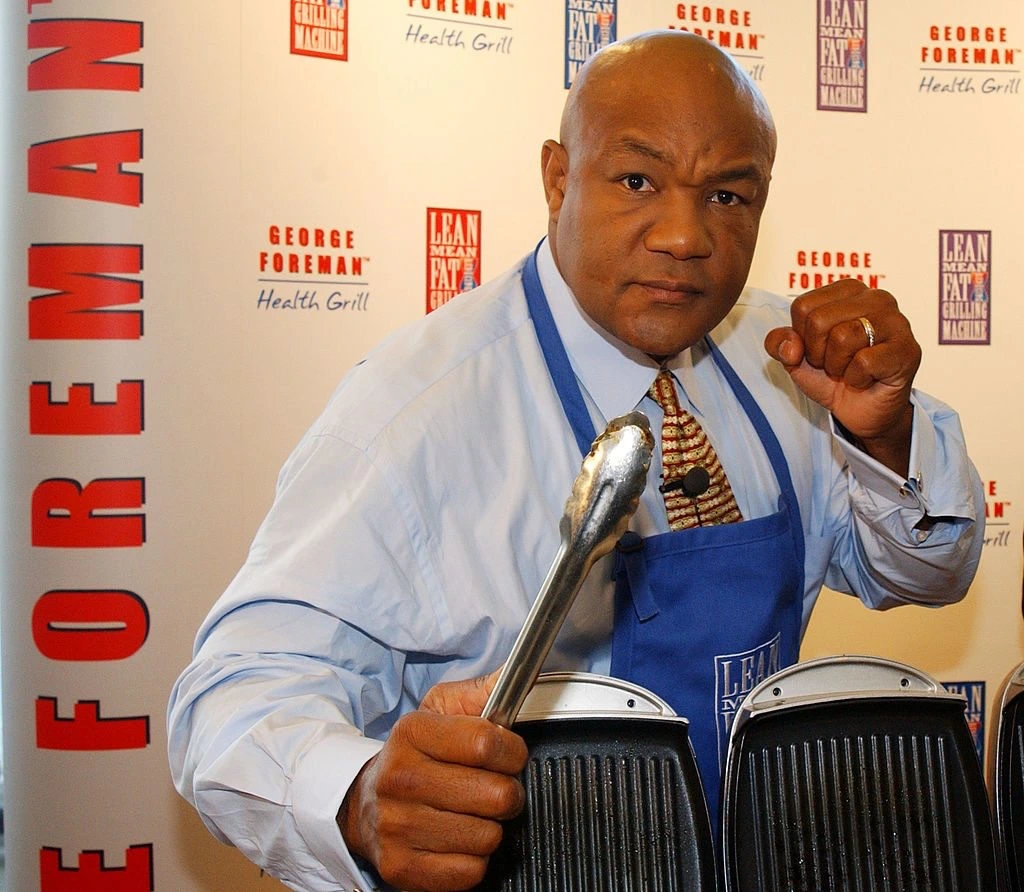

The grill not only works because of the popularity and whole-hearted marketing of the big man himself, it is also a phenomenal grill. If you don’t have one make sure you check out the George Foreman range of grills, they’re the perfect addition to any kitchen and a fantastically healthy way of grilling tasty meat.
It Happened – Foreman Writes Himself into History
Setting the amazing grill to the side, we track back to Foreman’s comeback in boxing. During his second career he actively pursued the heavyweight champion Mike Tyson, someone that Foreman felt he would easily outmatch and whose style being similar to Joe Frazier would make him vulnerable to the huge punches Foreman threw.
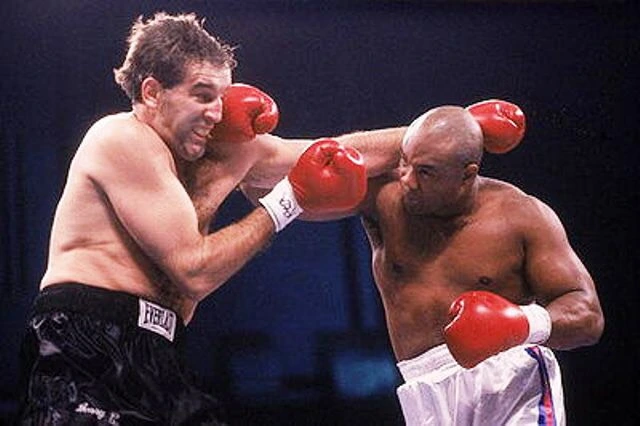

After a devastating win over Gerry Cooney with the single-most best knockout I have ever seen in boxing, Foreman was in prime position to challenge for the world heavyweight championship. Don King (Mike Tyson’s promoter at the time) approached George with a $5million contract to fight Tyson. Upon hearing of this Tyson allegedly lost his cool and told King he would not fight “that animal” and if King loved Foreman so much, he should step in the ring with him.
Ultimately like so many of George’s opponents, Tyson steered clear of fighting Foreman.
A title shot did present itself later with Foreman going 12 rounds with Evander Holyfield only to lose on a points decision. After the fight, Holyfield stated that no one had ever hit him as hard as George had and that he knew he was ahead on points being the more active fighter but he was concerned he would be knocked out in the final round and thus held on for dear life.
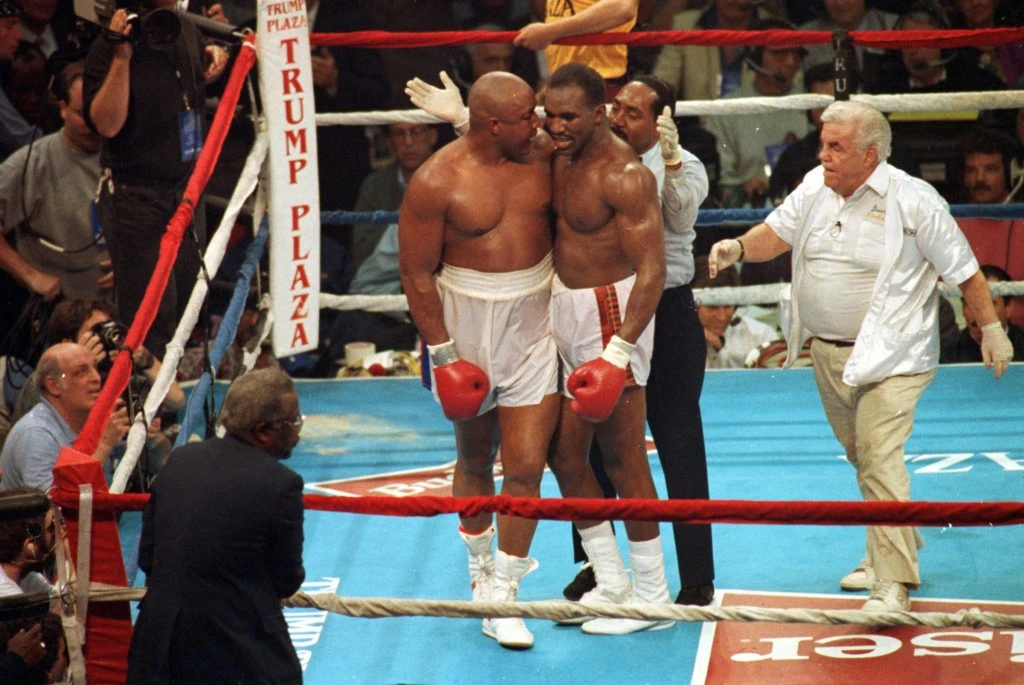

Foreman would get one last title shot, in a fight he was adamant he would win and one that no-one gave him a chance of winning. A twelve to one underdog, Foreman fought Michael Moorer (who had defeated Holyfield) and at the age of 27 was 19 years younger than Foreman.
Throughout the fight and much to the chagrin in Moorer’s corner (from the very vocal Teddy Atlas), Moorer believed he could knock out Foreman and spent the entire fight standing in front on George. The inevitable happened as it had done for every single opponent who stood static in front of Foreman and a firm punch sent Moorer to the canvas, bloodied, dazed and looking up at the lights, Moorer lost his championship.
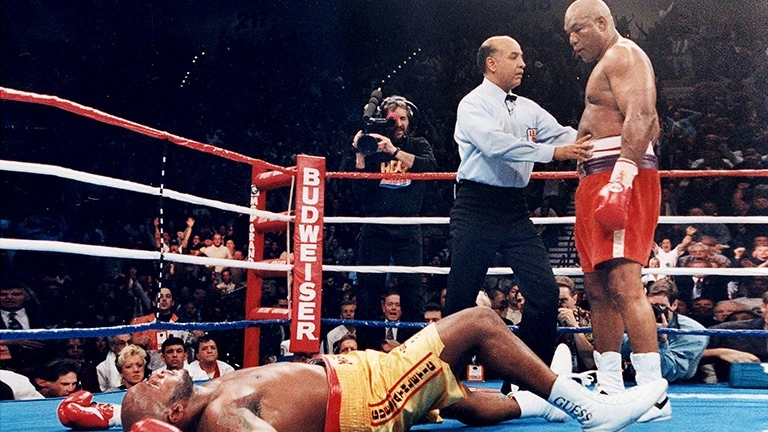

In the corner, Foreman down on his knees in jubilation was praying a thank you, wearing the red shorts he had lost to Ali in all those years ago. Poetic justice had been served and Foreman was the oldest heavyweight champion in boxing history.
Today, George enjoys life outside of the ring, ever popular and always promoting a product, he is the salesman, preacher and boxer that despite all the odds, kept on carving his own narrative.
Jokingly he muses, that he still has a little fight left in him and may make a comeback yet. One thing is for sure, even at the age of 70, I would not want to take a punch from Big George Foreman.
